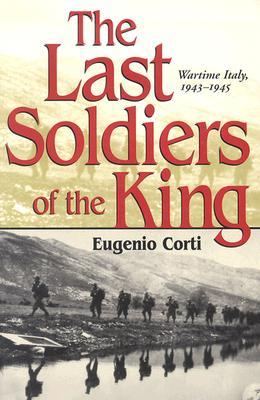Eugenio Corti should be well known to Chronicles readers as the author of the terrifying war diary Few Returned and The Red Horse, one of the finest novels of our time and perhaps the greatest piece of Christian fiction published in my lifetime. The Last Soldiers of the King is a very slightly fictionalized account of Corti’s experiences in the final years of World War II, when he and other Italian officers took an oath to serve under the Italian king against the German occupiers.
I am not a soldier, but the soldiers I have known described their experiences with the same unsentimental realism Corti displays in all his work. The life of the Italian soldier is compounded of dust, discomfort, and tedium punctuated by bursts of violence. When Mussolini was overthrown by his own party and the king in 1943 and the Italians declared an armistice, Corti was stationed outside of Rome. The German attack was devastating, and the author and his comrade Antonio Moroni walked south to find the British across half the length of Italy. The narrative of their rambles is a classic description of Italy’s great diversity. It is not an idyllic journey, and, in their weariness, the two young men, who begin the march as fast friends, quarrel frequently over nothing.
Young Eugenio and Antonio are naive Lombards (though Eugenio had survived the horrors of the Russian campaign), and they are continually astonished by the goodness and evil they encounter. In Lucania, Eugenio meets a young woman who is going to enter a convent, and, when she reproaches him for idling in bed, the young Lombard tells her he does not like her “Bourbon church . . . with those painted cardboard saints fitted with real beards. In fact, it offends my faith, especially all the tinsel attached to their garments.” When he complains that all that glitter is a survival of paganism, the girl agrees. “But tell me,” she asks, “are you sure that there are no leftovers of paganism in the great art of the cathedrals you love[?]” The young officer is speechless, but “‘Don’t trouble yourself,’ she added at once, compassionately, ‘this is our fate: we’ll never succeed in completely transforming the Earthly City into the Heavenly City.’”
Despite his respect for the Allies, alongside of whom he served, the young Corti is remarkably free of both hatred and ideology. He is fighting the Germans, not because of any race-hatred or commitment to the abstract principles of democracy. He is Italian, and they, who are occupying Italy, must be expelled. Faced with the desertions, incompetence, and, indeed, cowardice of many Italian soldiers, Eugenio feels unequal to the task, but he imagines the faces of friends and feels “ashamed for having begun to give up; we simply had to continue behaving like men, that was all.” And yet, as he confesses, “The discomfort remained and was deep enough to border on anguish.” I have read no better account of how a conscientious man wrestles with adversity, and, since the young soldier is neither a saint nor a libertarian, he is strengthened in his duty not by self-will or out of devotion to a cause but by the memory of conscientious friends.
Several years ago, when I was staying with my good friends Giuditta and Giusep-pe Podestà, Dr. Corti (he has a law degree) picked me up and drove me to Bergamo, perhaps the loveliest city north of the Po River. He called up an old friend, who apparently lived in a beautiful house he wanted me to see. We spent several hours strolling around the fine art museum, and, when I admired several works by the great painter of Bergamo, Giovanni Battista Moroni, Corti told me that his friend had many Moroni paintings. He was, in fact, a direct descendant of the artist and had inherited his house and art collection. I recalled the name, and Corti confirmed that this friend was the Antonio Moroni with whom he had tramped across Italy. They had not seen each other since. After showing us the house, Moroni (a successful architect) offered us drinks in his studio, and the two veterans, who had maintained some written correspondence, cautiously picked up the threads of their old story.
For months, I have been hoping to find another reviewer for this superb book. My reluctance to undertake this project had nothing to do with any reservations about the work or its author. I am an unreserved admirer of both. As a friend of the author and the man who suggested that the work be made available in English, however, no one could accuse me of impartiality. Impartial or not, I unhesitatingly recommend this as a good read and a wise book. It is a perfect gift for military veterans and for Christians of all ages and levels of education.
[The Last Soldiers of the King: Wartime Italy, 1943-1945, by Eugenio Corti, translated by Manuela Arundel (Columbia: University of Missouri Press) 304 pp., $24.95]

Leave a Reply